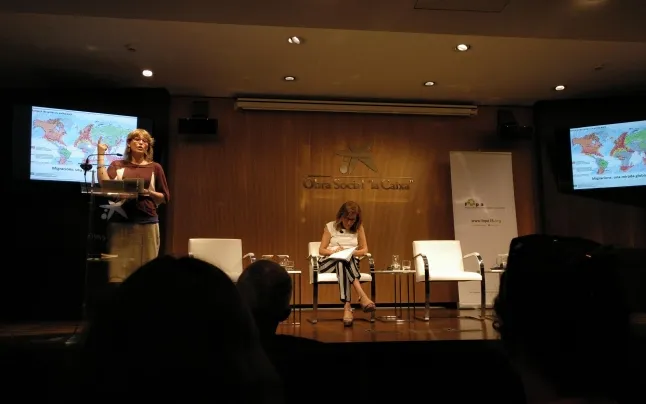The growing number of minors and youths that migrate alone has pushed the protection system to the brink of collapsing.
The Federation of Entities with Assisted Projects and Flats (FEPA, in Catalan) organized a seminar in Barcelona on ‘Prospect and perspectives +18. An international approachiva i perspectives 18+.’, to identify the strenghts and shortcoming of the programmes and resources available to deal with the arrival of unacompanied young migrants.
According to several studies and research, the level of education of this group is slightly below average compared to other youths of their age and, therefore, they face greater difficulties to access the labour market.
An international perspective on migration and youth migratory processes
The number of refugees and migrants in the world grows constantly. Migrants represent 3.4% of the world population, a percentage very similar to that during World War II.
Gemma Pinyol, the director for migration at Instrategies and associate researcher at GRITIM-UPF, explains that “migration has always existed, the problem is that refugees have been forced to move”.
Article 14 of the Universal Declaration of Human Rights explains that, in case of persecutions, migrants must receive asylum. Pinyol recalls that “signatory countries of the declaration have the duty to provide asylum, but in practice there is no European regulation because the final decision is taken by States”. “Therefore, we’re facing a global situation with a local impact and international regulations”, she adds.
One of the problems Pinyol mentions is the growing number of unaccompanied minors. “More and more minors are travelling alone and their background and profiles are very different. In Spain we see more boys, whereas in Greece they have more girls and we must understand the reasons why we need to find answers for all of them”, Pinyol expalins.
“If we don’t understand that the cost of living away from one’s parents and family translates into a lower academic performance, we will never find appropriate answers to meet the needs of youths in this situation and, therefore, we will only generate problems for the future”, she warns.
The director for migrations at Instraestrategies explains that “the European Union isn’t living a refugee crisis, it’s a crisis of the way the European model is managed and a crisis of values”. “It is true that the European Union is to blame, but behind that we have it’s member states”, she adds.
The researcher associated to the GRITIM-UPF concludes that “States see migration as representing three threats: a threat to national security, a threat to their welfare state and a threat to national identity. The focus is on border control, we are secularizing and externalizing migration control, distorting the goals of development policies and criminalizing solidarity”. There’s no talk on safe ways or policies that could ease migration management; instead, migrant’s fundamental rights such as the right to seek asylum and maritime rescue are being violated”.







Add new comment